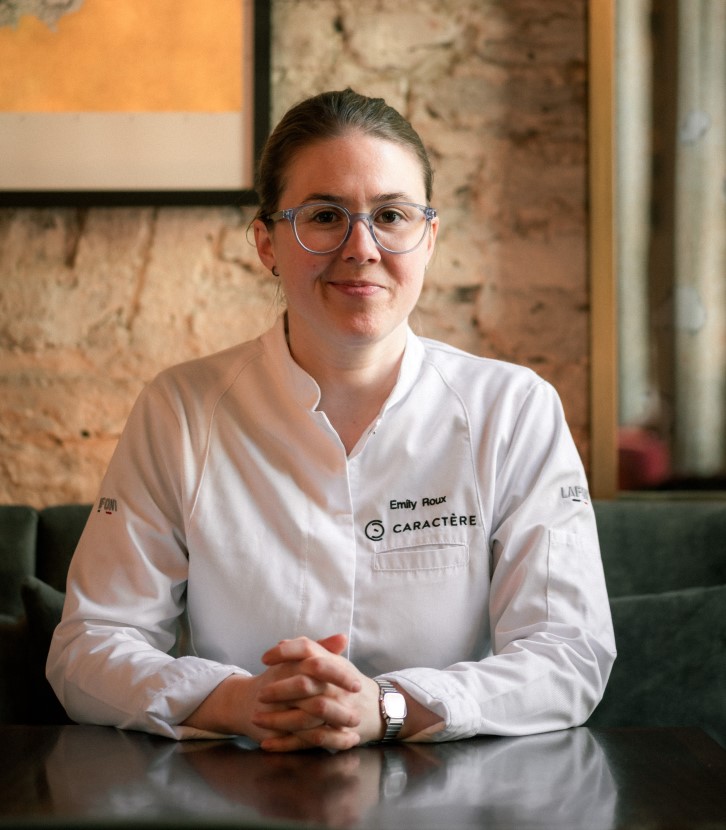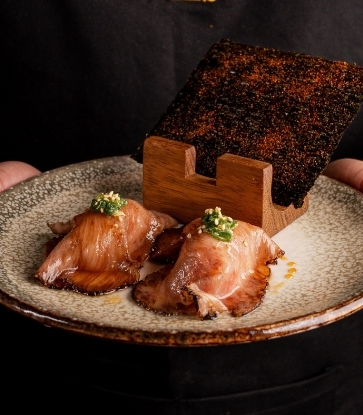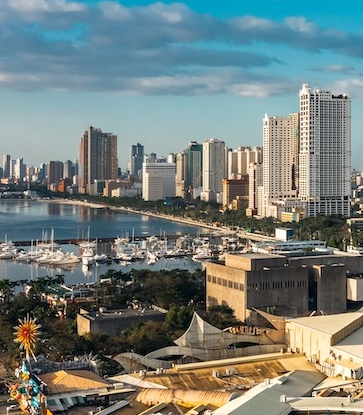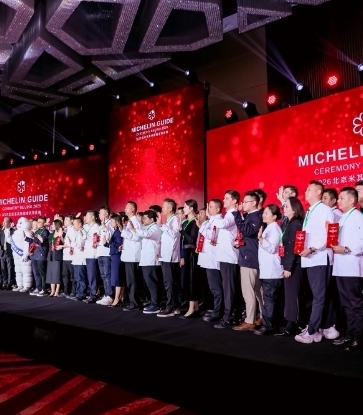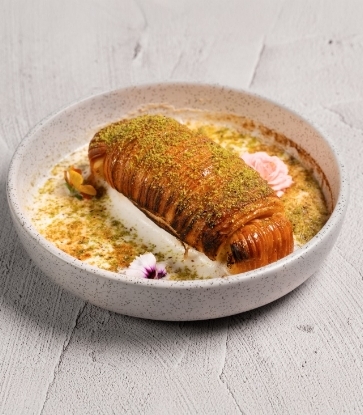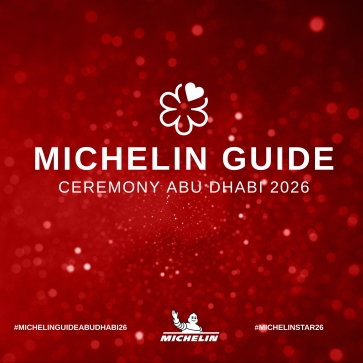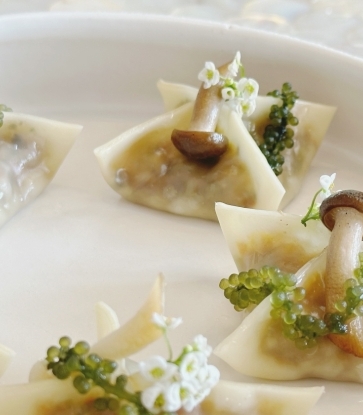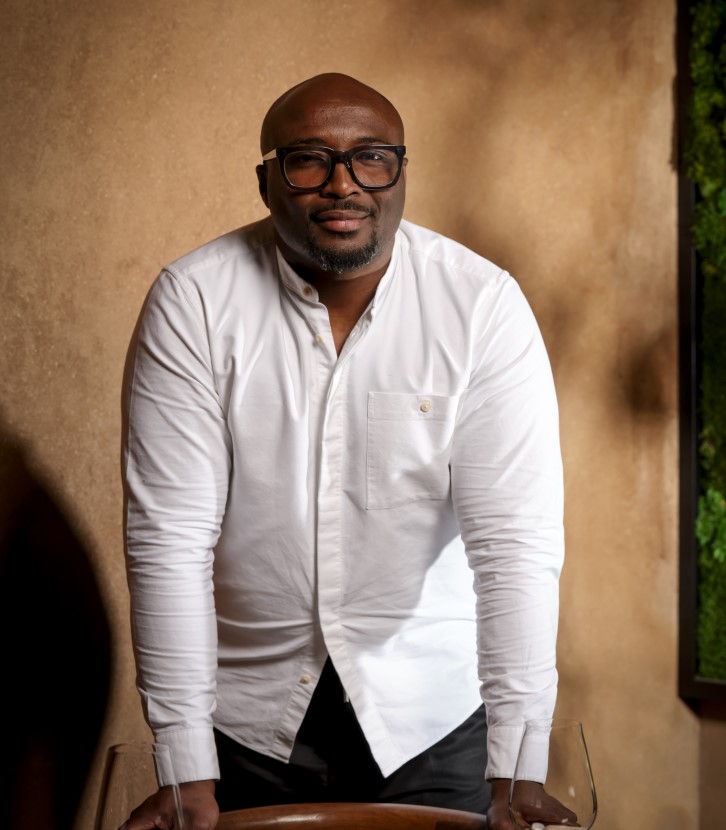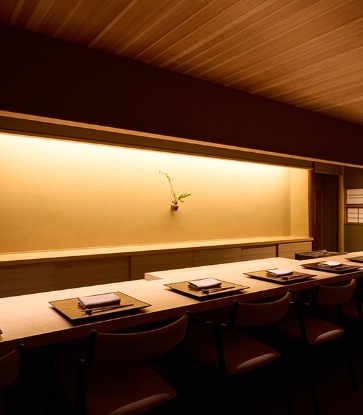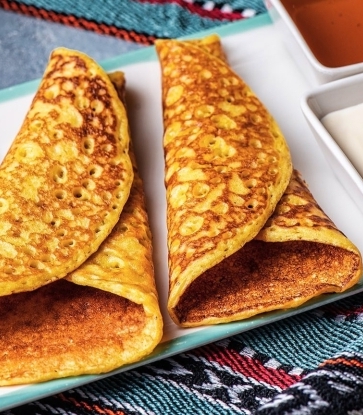At the age of 33, Thinus van de Westhuizen is the youngest and the fourth South African chef to have received a MICHELIN Star. The chef de cuisine of 99 Sushi Bar, which was recognised with its first MICHELIN Star in the MICHELIN Guide Abu Dhabi 2023, Van der Westhuizen is also a brain cancer survivor who has made a name for himself within the Spanish-owned Japanese restaurant group 99 Sushi Bar as a South African chef.
According to our MICHELIN Guide inspectors, there’s no shortage of finesse and precision in the well-constructed and beautifully presented dishes at this chic restaurant. Ahead, Van der Westhuizen recalls the moment when he decided to become a chef, his first encounter with Japanese cooking, and how he felt when 99 Sushi Bar received its first MICHELIN Star.
When did you realize you want to become a chef?
It happened when I was cooking with my dad when I was, like, 13 years old.My dad and my uncle were in the military. So you grow up with that kind of discipline and I always felt that I would be either a chef or in the military. And it's not because I was forced to do that. It's just because those were the two loves of mine, mostly for the camaraderie and the brigade and the way that the kitchen operates, you know, the discipline you have to have and coupled with the creativeness side of it. And you can really express yourself when you are cooking.
Obviously the love of cooking was instilled in our family because my mom could cook, and my dad could cook. Sundays and weekends were like feasts. My grandmother was a fantastic cook, too. And food was always a big part of our family and what brings our family together.
Tell us about your first encounter with Japanese cooking.
My first encounter with Japanese cooking was at a Japanese fusion restaurant in Plettenberg Bay. I would work in a hot kitchen and then I would go over to check in the sushi counter and it took me three months for the sushi chefs to warm up to me because it's like it's not something that they really give out.
What makes 99 Sushi special?
Number one is the quality of the product we use. We really strive to get the best of what we can. And luckily, in this country, you can really get anything you want.There is a big trend because Japanese cuisine is all hip and happening now. But I feel like people are losing the essence of Japanese, where I feel like we don't do that. We have flares of Spanish influence, but as a base, it's much more Japanese because you get other restaurants like Peruvian Japanese, but they change the whole way that it's supposed to be. The biggest compliment I've received here at 99 is from the Japanese ambassador of the UAE. She came here with the minister, and after the meal she told me it feels like she's eating at home. That was like the biggest compliment anyone could ever have.
And obviously our service and the way our general manager Jaime Castaneda, culinary director Ruben Guerrero and I instill how we operate, it follows through in the staff as well. So we have a really great team that's been together for a long time, which makes a difference. You can see it in the service, you can see it in the way we treat guests. So it's a whole package together.

How would you describe your cuisine to a first-time diner at 99 Sushi?
I would say it's Japanese cuisine at its heart, but with Spanish flavours running through the menu. We have dishes like chawanmushi, which is a traditional egg custard dish but we make it with a crab stock and we add truffle to it with our little touches. We add king crab, caviar, and uni. We make a shiitake dashi stock instead of normal dashi stock. We try to keep the essence of the Japanese, but we do it a little bit differently.Tell us about your signature dish(es).
Our spicy tartar is one of the most popular dishes on the menu. We have our lobster maki, which is popular because our makis are cooked, so it's a big hit with especially the local guests.We've got higher-end dishes like the umami Krystal toast, we fly in Spanish crystal toast and serve it with uni, caviar, and toro. It's an amazing dish.
Our sando is great. I do my sando a little bit differently than the traditional katsu sasndo. We make our own sauce. I don't use thick bread, my bread is much thinner. It's also milk bread, but it's much thinner and crispier. I make a different katsu sauce, I don't do the regular tonkatsu. I add a little bit of Dijon mustard and a few other ingredients.
Tell us about your first encounter with the MICHELIN Guide, and what influence has it had over your career?
It's something that you always strive to achieve, the MICHELIN Star is like the World Cup when you're a chef in South Africa. But unfortunately, to get one you have to go outside of South Africa. So when you hear about the MICHELIN Star and when there's movies about it and people talk about it, it's a big dream as a chef to get something like that. It's like one of the pinnacle points to get there. You have all those other awards, but the MICHELIN Star is the most special one for a chef. I never thought even moving here that we'd get the MICHELIN Guide here. Before we got the invites, we didn't even know the MICHELIN Guide was coming to Abu Dhabi. So when the MICHELIN Guide came here, it was like, okay, this is awesome now, because now finally we have a chance.It's a big thing. You know, everybody talks about it. And chefs like Alain Ducasse and Robuchon and Gordon Ramsey are legends. So it's something that you aspire to as a chef, to leave a legacy. And for South Africa, my social media has gone absolutely mental. I'm doing a press tour in South Africa because I'm the youngest and only the fourth South African to have a MICHELIN Star.

How did you feel when you found out 99 Sushi was recognised with its first Michelin star?
I mean, we thought we'd be selected, but we never expected that we'd get a MICHELIN star. So we were sitting there and then they called the special awards. And then I looked at Ruben and Jaime and I'm like, it's getting real now. So when they started to announce the Stars, I just look at Ruben and I said, don't look at me, I don't want to talk to you right now. When they called 99 Sushi, I kind of blacked out. There were people running from the other side of the gala just to come and hug us, just like a crazy thing. And it's very mental, absolute mental. Ruben’s Instagram and my Instagram crashed after the award. It's crazy. I can't even remember what I said on stage. It was just a blackout. I've been cooking since I was 16, so it's been 17 years now. It's the combination of that and everything I've been through and all of these things. It was just a massive moment. Every time I called my mom for like a week after, it was just tears from her.The first month, even for me, I just threw water in my face so I could wake up because it felt like a dream. It doesn't feel real. But slowly now it's sinking in.
Who was the first person you called when you found out?
My mum. I was like, hey, mom, guess what? I'm a MICHELIN chef. And she started crying, because my dad passed away last year. It's been tough for the family. But it was just joy.What does 99 Sushi’s MICHELIN Star mean to you?
So it's quite a romantic story, because in 2018 and 2019, we had a MICHELIN-starred restaurant in the group called 99 KŌ Sushi Bar in Spain. It was the flagship restaurant of 99 so the MICHELIN Star was one of our bragging points.
Then Covid happened, and that restaurant was very tiny because it was more like omakase-style, so they had to close down. So when we got the MICHELIN Star, it was kind of like a recognition for the group and for the owners as well.
The same for me, it is ecstatic considering I'm not Spanish and it took some convincing for me to make a name in the group at the beginning.









